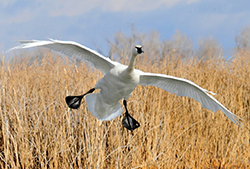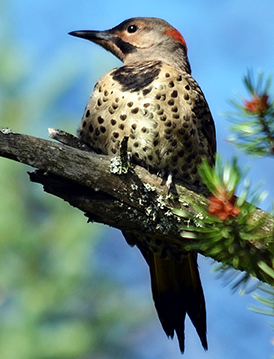Bird Related Events & Programs
Great Backyard Bird Count - February 18, 2023
Start Time 9 am 1 ½ hours 3 Observers White-breasted Nuthatch: 4 Northern Cardinal: 4 American Goldfinch: 10 Dark-eyed Junco: 8 American Tree Sparrow: 6 Mourning Dove: 8 Canada Goose; 8 House Finch: 4 European Starling: 33 Hairy Woodpecker: 1 Downy Woodpecker: 2 Ring-billed Gull: 1 Black-capped Chickadee: 11 Red-bellied Woodpecker: 1 American Crow: 1 Coopers Hawk:1 Dufferin Marsh Bird Walk - May 29, 2022 American Robin Red-winged Blackbird Baltimore Oriole Northern Cardinal Warbling Vireo Belted Kingfisher Black-capped Chickadee American Goldfinch Mourning Dove Common Crow Yellow Warbler Hairy Woodpecker Common Grackle Tree Swallow Blue Jay Willow Flycatcher Eastern Wood Pewee Red-eyed Vireo Great Blue Heron Song Sparrow House Wren Swamp Sparrow Wood Duck Eastern Kingbird Rose-breasted Grosbeak European Starling Chipping Sparrow Purple Finch Yellow-bellied Sapsucker Cedar Waxwing Killdeer Common Yellow-throat Brown-headed Cowbird Gray Catbird Great Backyard Bird Count - Feb 21, 2022 Trumpeter Swan European Starling House Sparrow American Goldfinch Northern Cardinal Blue Jay Morning Dove Black-capped Chickadee Tree Sparrow Canada Goose White Breasted Nuthatch Downy Woodpecker Dark-eyed Junco Common Crow House Finch Great Backyard Bird Count - Feb 15, 2021 American Gold Finch Blue Jay Mourning Dove Black-capped Chickadee Common Raven Tree Sparrow Dark-eyed Junco Common Redpoll Pine Sisken European Starling Hoary Redpoll Mary’s Birdathon - May 20, 2020 I really wanted to hear the “dawn chorus” on Birdathon day so I set my alarm for 5 am thinking that would give me lots of time. It was still dark but I checked outside and sure enough there was a cacophony of bird songs. So I made a cup of coffee and thought I would settle in to listen to the sounds, but when I opened my door a second time it was relatively quiet. I had missed it. In that five minute period it went from crazy to serene. Sigh! So what birds did I identify in my yard? Northern Cardinal, American Robin and Mourning Dove. This was definitely a slow start to the day. The sun was finally up so I traipsed down to the Dufferin Marsh and identified many of the regular characters. Baltimore Orioles were singing like crazy, and I heard our reliable Swamp Sparrow. Of particular note was a Blackpoll Warbler – the first I had seen for the season. Often I get a good number of Warblers in the cedar trees along the edge of my property but this year I identified five warbler species in the Dufferin Marsh. Besides the Blackpoll Warbler I saw Blackburnian Warbler, Palm Warbler, Common Yellowthroat and Yellow-rumped Warbler. I love the loop trail around the Roselena neighbourhood. You never know what you may see there. So that is where I headed next. Least Flycatchers were calling everywhere with their “che-beck” sound. I heard a Meadow Lark and Field Sparrow calling from the adjacent field. The most surprising sighting was a Scarlet Tanager. It’s funny but sometimes something makes you look up, and I did, and there it was. This bird is so startlingly beautiful it makes me think that everything must be right with the world. As I came around the corner and was almost done with the trail I looked up (again I am not sure why) and there was a silhouette of a tiny little Ruby-throated Humming Bird. I think it was curious about me because it did not move from its perch and just let me pass. I did not see any warblers on the Roselena trail which was unusual. This is usually my go-to place for warblers. I walked along Main Street and in behind on the Fair grounds. I had seen an Indigo Bunting back there just two days previously. Chimney Swifts and Barn Swallows were chattering away. The most surprising find were 2 Mallards enjoying a swim in a puddle on the Fair grounds. I guess that is why they call them “puddle ducks”. No Indigo Bunting was spotted. Hoping for ducks, or swallows, or shore birds I set off for the Trisan Centre. The Region of York has developed a wetland habitat there out of the old sewage lagoons. Unfortunately it was pretty quiet. I did see a Spotted Sandpiper, Northern Flicker and a Red-tailed Hawk. Kettleby was my next stop. I had not seen a Bluebird yet this year and was hoping for some to be using the nest boxes on the east side of town. Nothing! In fact I had to work really hard to hear Savannah Sparrow and Bobolink. I can usually identify these birds by just opening my car window at this location. I was starting to realize that I was going to have to work hard in general to get a good list of birds. Nothing seemed as expected. Usually I do my Birdathon on Mothers’ Day weekend but with the crazy spring weather and intermittent migration I put it off. Now I was paying for it. After lunch I headed to Cold Creek Conservation Area. Again I was looking for Bluebirds. Walking through the forest I heard a persistent Nuthatch call. I have a hard time telling the difference between White-breasted and Red-breasted Nuthatches by call but a friend told me that Red-breasted Nuthatches are more assertive and this was definitely that. However the sound was coming from way up in the treetops and no matter how much I tried to call it down, it remained elusive. So I decided to listen to a Red-breasted Nuthatch call on my phone. Well … that bird dove down and almost attacked me. It was definitely a Red-breasted Nuthatch and after apologizing profusely I moved on. I saw my 6th warbler of the day – an American Redstart. Finally, walking up the trail past the barn, I saw an Eastern Bluebird. This was in the same location that I saw one last year so maybe the same breeding pair was back. Happy Valley had been a hotbed of activity about a week before and although quieter I did identify Ovenbird, Black-throated Green Warbler, Red-eyed Vireo, and Piliated Woodpecker. A Wood Thrush was singing. This is a remarkable sounding song, reedy, melodic and haunting. The bird came down to greet me and I got a good look at it. There is one bird that I have heard several times at Happy Valley in the same location. It has a warbling loud musical song, but for the life of me I do not know what it is. That will be a problem for next year. Hoping for a Belted King Fisher and an American Woodcock I headed out again after dinner. I heard a Black and White Warbler at the Dufferin Marsh and Cedar Waxwings, Great Blue Heron and Belted Kingfisher at the Roselena Trail. In total I identified 64 bird species and although I had to work hard I think that is about the same as I usually see. Some of you may know that I am doing a “Big Year” this year for Schomberg. That is, keeping track of every species I identify in a one year period. I started on March 1 so I could count the Northern Hawk Owl and this Birdthon added five new species to my list. I have included a list of the birds below in order of when I identified them. Thank you so much for your support this year. I have raised a record $ 2340 for bird research and conservation. 25% of that will be designated for the work of the Dufferin Marsh Nature Connection. Keep well everyone. Mary List of Identified Birds
Bird Opera
In the March 2020 Newsletter, we mentioned a bird opera that you can watch here: http://volkerpannes.de/portfolio/bird-song-opera/ And we challenged you to name as many of the local birds as you could. Here is the list that we have found:
|

Mesmerizing Migration: Watch 118 Bird Species Migrate Across a Map of the Western Hemisphere
For the first time, scientists at the Cornell Lab of Ornithology have documented migratory movements of bird populations spanning the entire year for 118 species throughout the Western Hemisphere. The study finds broad similarity in the routes used by specific groups of species—vividly demonstrated by animated maps showing patterns of movement across the annual cycle.
Click here to see the map.
For the first time, scientists at the Cornell Lab of Ornithology have documented migratory movements of bird populations spanning the entire year for 118 species throughout the Western Hemisphere. The study finds broad similarity in the routes used by specific groups of species—vividly demonstrated by animated maps showing patterns of movement across the annual cycle.
Click here to see the map.

And yet more cool bird data! Click here to see a graph that shows the migration and residency times for birds right here in York Region.

